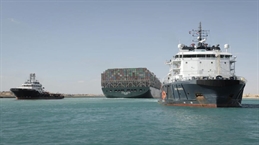
The Suez Canal Authority (SCA) has introduced a new toll rebate for large container ships to encourage carriers to return to the route in an effort to restore traffic, as Houthi threats in the Red Sea subside.
The Authority overseeing the Suez Canal said the move is "in response to requests from containership owners and operators, and in light of recent positive developments in the security situation in the Red Sea and Bab al-Mandab Strait.
"Laden or ballast containerships of Suez Canal net tonnage 130,000 tons or above, transiting the Suez Canal (northbound or outhbound) are granted a rebate of 15% upon transit," SCA said in a circular.
It noted that the rebate percentage is only calculated from normal transit dues stipulated by the transit dues table, in addition to surcharges levied on tiers of containers.
"The aforementioned rebate is directly granted upon transit without the need to submit any requests or documents," SCA said.
The rebate is applicable to containerships”transiting the Suez Canal starting from May 15, 2025, and for a period of 90 days.
The Suez Canal, a vital artery for global trade, has faced significant disruptions due to Houthi attacks in the Red Sea, forcing many shipping companies to reroute their vessels around Africa’s Cape of Good Hope. This shift has led to longer transit times, higher fuel costs, and a sharp decline in canal revenue, which fell from US$10.3 billion in 2023 to around US$4 billion in 2024.
The Iran-backed Houthi rebels began targeting commercial ships in November 2023, claiming they were linked to Israel and its allies. The attacks escalated, prompting major container lines such as Maersk, MSC, and Hapag-Lloyd to avoid the Red Sea route altogether.
In May 2025, the United States and the Houthis reached a ceasefire agreement, mediated by Oman, under which the Houthis agreed to halt attacks on U.S. military ships in exchange for the U.S. ending airstrikes on Houthi positions in Yemen. However, the Houthis maintained that Israeli-linked vessels were not part of the deal and would still be targeted.
Despite these incentives, shipping giants remain cautious, citing security concerns and high war-risk insurance premiums.



